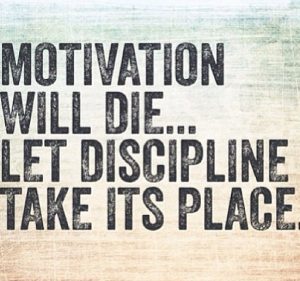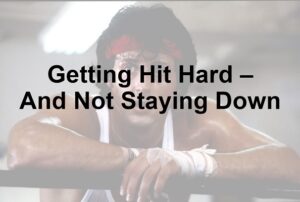…Age
Just recently, as many readers know, I’ve renewed my focus on my health. I am not participating in any type of fad diet, nor using any diet “program.” I’m not paying into CrossFit, Isometrix, Tone-ex, yada yada. I’m using that ancient and under-appreciated method that has been proven over millennia: I’m eating cleaner and exercising more.
The challenge I sometimes find is my motivation waning. As I considered that this morning, I realized that my maintaining motivation seems more difficult now than it did when I was… say… 19. Of course, there’s a major difference: I don’t have a Drill Sergeant yelling at me now.
…Short Term Goals
Back then my goals were quite easily identified and, quite often, given to me by someone else. I had to pass a physical fitness test which mandated certain measurements of push-ups, sit-ups and running. The goals were short term. I was thinking about the fitness test I was going to take next week, next month or to graduate from MP school. Without that Drill Sergeant or those performance mandates to keep me going, what would have driven me?
…Discipline
I once read that “When motivation is low, discipline is what keeps you moving.” That is certainly true more often than not these days. Without that Drill Sergeant to “motivate” me… without those short term goals, it is a frequent occurrence that I find myself with the time to exercise but no motivation to do so. But, I force myself to go and exercise anyway. I discipline myself to keep exercising; to do it even though I really don’t want to; to pursue a longer term goal than feeling good today.
…Long Term Goals
And what would those long term goals be? A far cry from thinking about next week’s PT test or what I have to do to graduate from the police academy… The greater number of years behind me now motivates me to think about things like quality of life and longevity. As we age, it’s far easier to recognize how quickly NOT exercising or paying attention to your diet can have a negative impact on your ability to function and your health. The most interesting part about learning this reality of life is the secondary lesson learned: if, when I was 19 years old and feeling invincible, I had been thinking about quality of life and longevity, I wouldn’t have to worry about it as much now. If I had maintained that physical training, without interruption, since back then, I’d be fit, healthy and not working as hard to “stay young.”
Further, as an older… maybe “more mature” would be a better term to use… but as a person who carries the responsibility, at least in part, for motivating the next generation of officers to stay in shape. As I continue to train law enforcement professionals, I can’t impress upon them enough the importance of maintaining their FIRST weapon: themselves.
…Leadership
The addition of that responsibility to motivate others, a part of leadership in any organization, becomes motivation. Even when we are at our worst and truly feeling a complete lack of motivation, the responsibility we have to others can drive us. That drive forces us to act with motivation; to be the example for others when we really don’t want to be. That’s a skill I’d venture to guess every motivational speaker has mastered.
…Public Speaking
I know that making public presentations for educational purposes is slightly different from motivational speaking, but PUBLIC speaking is public speaking. When you have to stand up in front of audiences numbering from 25 to 500, you either are prepared and can do it, or you’re not and you can’t. Many of us have sat in such an audience but not as many of us have been standing up front.
One of the lessons you learn real quick, if you’re that person up front, is that the audience can tell if you’re nervous, motivated, scared, forcing yourself to be there, etc. The absolute best presenters I’ve ever seen have entertained as they made their presentations. They have cracked jokes, made funny references, told interesting stories as analogies and more. They have taken their presentation from the level of dry presentation to informative entertainment. The difference between the two, in my experience, is their level of motivation and preparation. Confidence plays a huge role as well.
Before you can take a presentation and change it from purely educational to entertaining as well, you have to not only know the material inside and out but you also have to know yourself, be having fun and enjoying the process. Knowing the material that intimately requires discipline. Knowing yourself is a mandate for anyone who makes a career of public speaking, or whose career involves it. When you reach the point where you’re just having fun giving whatever presentation is at hand, then that becomes motivation in itself.


